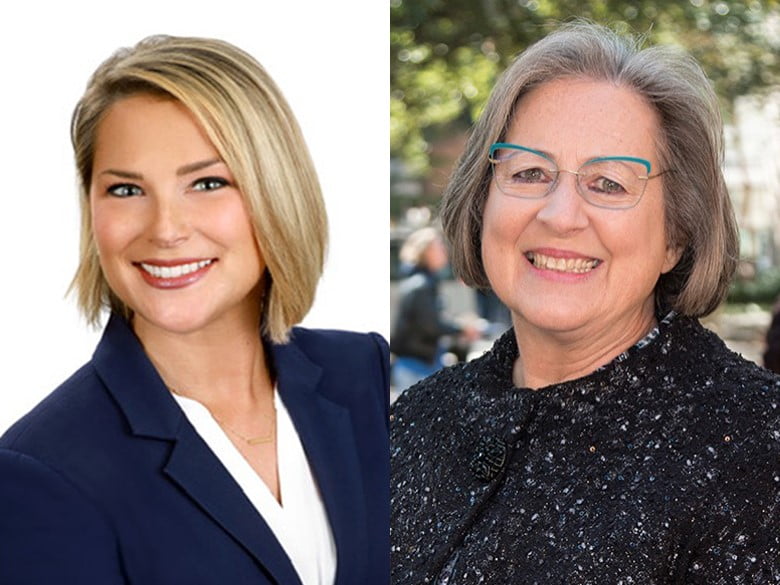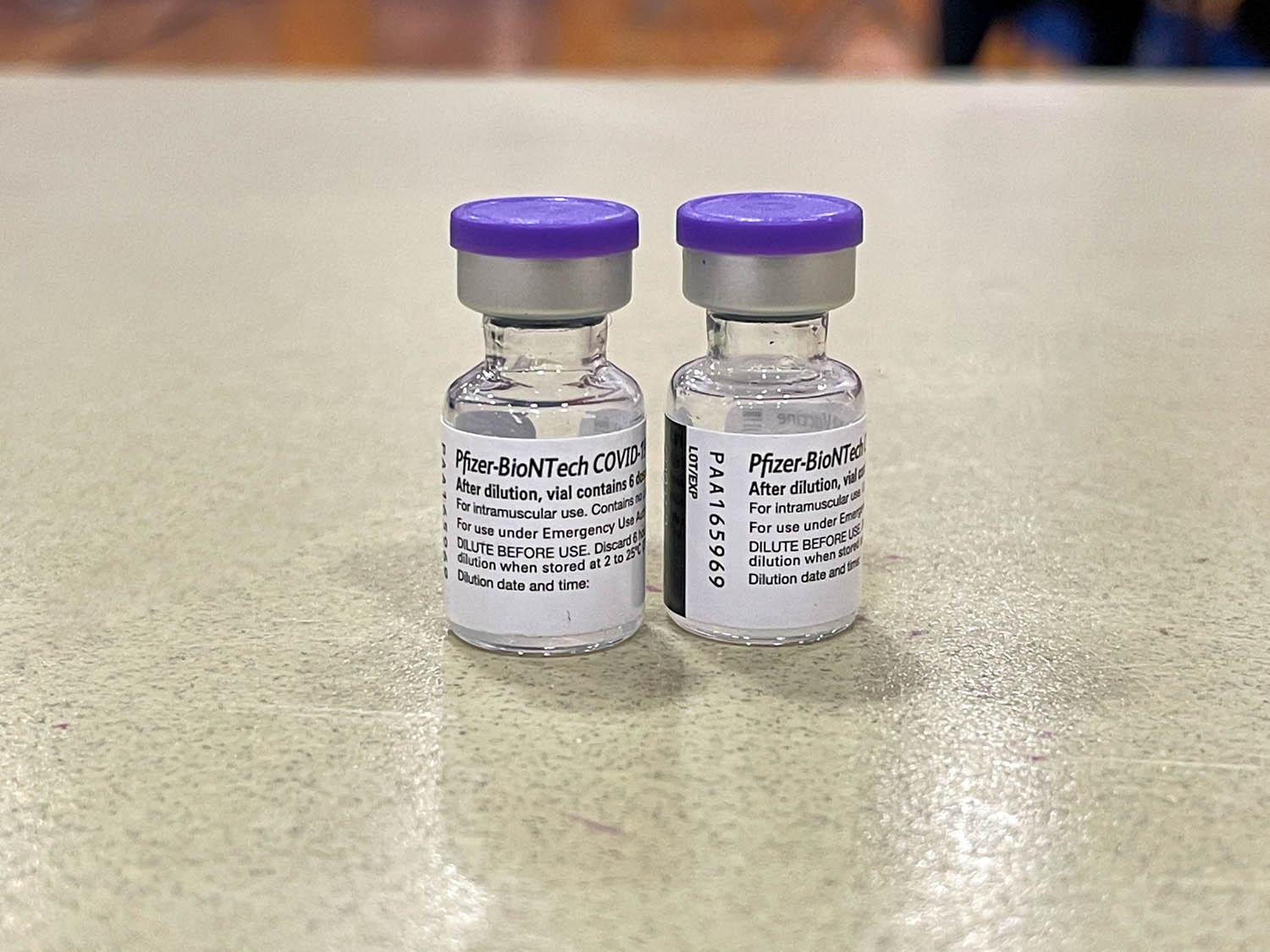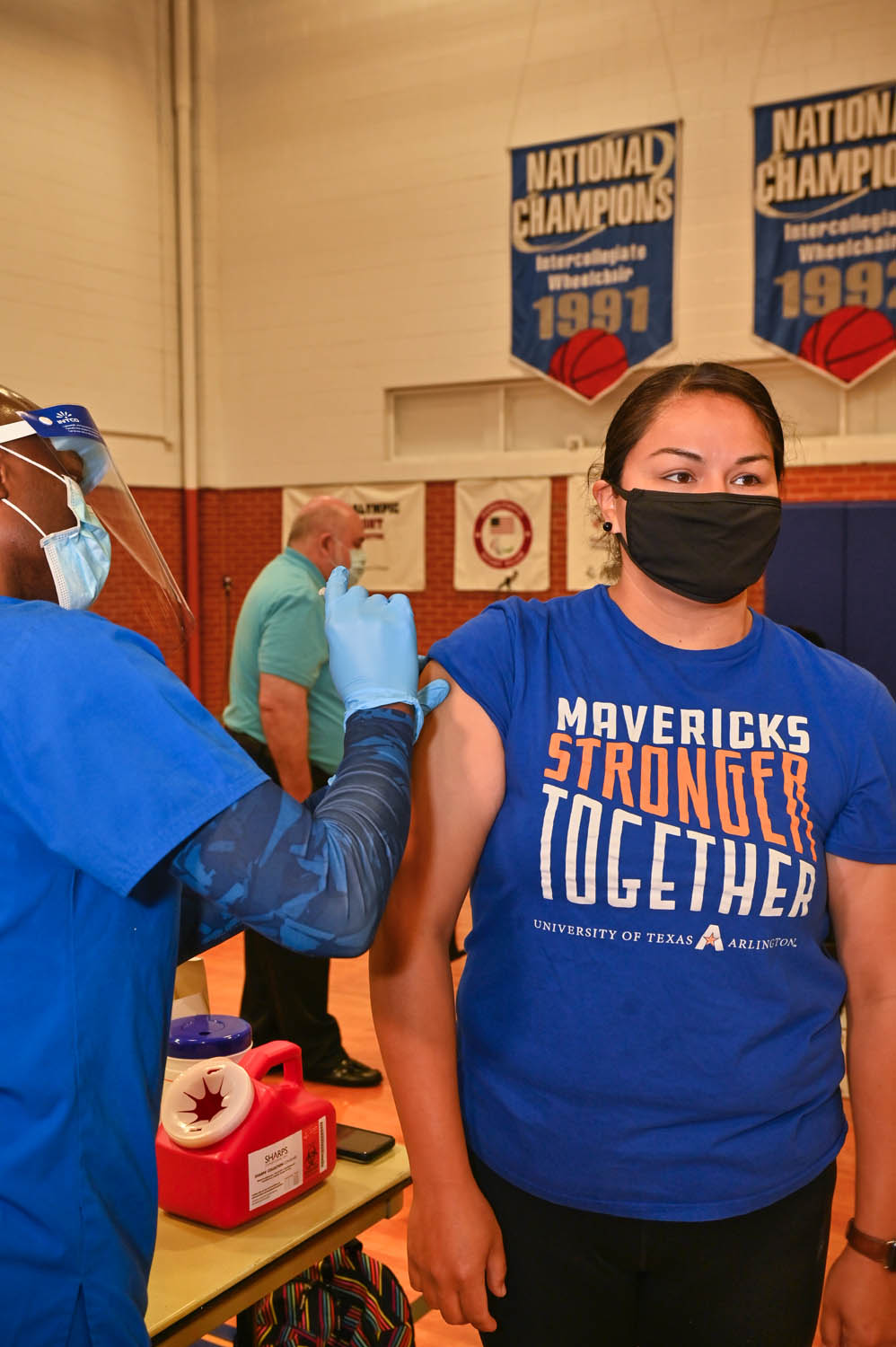Vaccines ‘imperative for the safety of our community’

As public health experts at The University of Texas at Arlington, Erin Carlson and Rebecca Garner have decades of research, education and policy experience regarding transmissible diseases and how to safely protect the public from their spread.
Carlson directs the Graduate Public Health Program and is an associate clinical professor in UTA’s College of Nursing and Health Innovation (CONHI), while Garner leads the Undergraduate Public Health Program and is an assistant clinical professor in CONHI.
They agreed to share their expertise with the UTA community on the importance of getting vaccinated, even for the young and healthy, as well as why vaccines are important in fighting COVID-19. They also discussed recent developments with the Delta variant, masking and how to combat misinformation.
Q: What is a vaccine?
Carlson: Vaccines protect us from disease by triggering an immune response. In addition, they train our immune system to recognize a disease—in this case SARS-CoV-2, the virus that causes COVID-19.
Garner: I found this great resource on the World Health Organization website that sums it up nicely. I encourage students to check it out.
Q: How safe is the COVID-19 vaccine?

Carlson: Once concern we frequently hear is, “How can a vaccine that was produced so quickly be safe?” That’s a fair question. But we have to remember that there were several things that were unique to the COVID-19 vaccine that made it possible for us to produce a very effective vaccine quickly.
First, the technology to develop that vaccine was already there. We already had mRNA vaccine technology; we just had not needed to deploy it yet.
As far as the fact that it was produced so quickly – well, think about it like this: Any project in any workplace takes a fair amount of time to complete for any one or two people. But what if you pull everybody in the workplace off every other project, and you put them on the same one? That would get done a lot quicker, wouldn't it?
That's what happened with COVID. You can make a vaccine quickly when you pull every brilliant mind, every scientist available, off everything else they're working on and you put them only on COVID. It wasn't that any corners were cut. It still went through all of the protocols that a vaccine would go through.
Here are some great resources that talk further about the safety and effectiveness of COVID-19 vaccines:
- CDC: Ensuring COVID-19 Vaccine Safety in the US
- WHO: How COVID-19 vaccines are regulated for safety and effectiveness
Q: Who should get vaccinated?
Carlson: Everyone eligible should get vaccinated for COVID-19. This is absolutely imperative for the safety of our community, our nation, our world. The more people who are vaccinated, the quicker we will stop this virus. If you have underlying health conditions, I would add that it's a decision you need to make with your health care provider.
Q: Why is getting vaccinated important?
Garner: The risk of getting COVID remains high until we have achieved herd immunity. It's important for our student population at UTA to remember that even if they contract a mild case of COVID and recover, they could infect others.
I'm hoping that our students will think about who they might expose in their families: elderly relatives and young children, for example. It's just really important that we look at this less from an “I” and “me” situation to more of a “we.” What can we do to try to protect our community? Don’t just think about the personal impact that it might have.
We know that some people are deciding not to get the vaccine until more people have had them—that's referred to as vaccine hesitancy. But waiting too long to be vaccinated allows the coronavirus to continue spreading in the community with these new variants emerging. So bottom line: The sooner you get vaccinated, the sooner you're protected, and then the people you care about are protected.
Q: Should we be concerned about the Delta variant of COVID, and will the vaccine protect against it?
Carlson: There is adequate science to believe that those who have Pfizer and Moderna vaccines will still be well protected against the latest Delta variants, and we hope that means some of the variants to come. This is not the end.It's very important to get vaccinated more than ever right now, because of the variants that are emerging. The reason that variance emerged is because of transmission. The variance occurs when, from host to host, a virus copies and little mistakes are made in the genome. The more times it copies, the more chances those mistakes make mutations. That means that the more transmission we have, the more we're going to have variants emerging.

Q: What advice would you give to those who say they are young and healthy or that they never get a flu shot?
Garner: There's this idea among young people that “I don't ever get the flu” or “I don't ever get sick” or “I don't have health insurance because I don't need it.” Young people tend to feel like they're invincible. And if they do get sick, they just push through and get over it. I saw it in myself as a young person. I saw it in my two kids as they were growing up, and I see it among so many of our students at UTA. It's very common.But the thing is, COVID-19 is not common. There are so many people in their 20s, 30s and 40s who were never sick enough to end up in the ER before and now are hospitalized because of COVID. Now they have long-lasting respiratory difficulties.
Carlson: You might not get sick with it. You might be lucky. But you can still get COVID and you can give it to others. Maybe one of those people who you give COVID to gets seriously ill.
Getting the vaccine, you protect that from ever happening. You prevent yourself from being the person that gives COVID to somebody who would get seriously ill. You protect others on campus. You protect those you work with. You protect your family and friends.
Everyone we know who has either died from COVID or had very serious effects from having COVID got it from someone. Someone gave it to them. Don't be that person who causes someone else to be ill and causes someone else’s family to worry about their loved one.
Q: Are there benefits to getting the vaccine?
Garner: Lots! We know that people who get the vaccine are less likely to get sick and more likely to be able to go back to work and stay at work. If someone has been vaccinated, he or she can feel a bit more at ease to be able to take his or her mask off. But if somebody has not been vaccinated, they need to wear a mask all the time. They need to practice social distancing all the time. They need to avoid large, crowded areas all the time.
Q: Where should we look to for trusted sources of information?
Carlson: There are lots of trusted sources. The World Health Organization will not steer you in the wrong direction. If for some reason you don't trust your own government, then turn to the World Health Organization. I have profound faith in the World Health Organization and the information they put out.
Another source of trusted information is the National Institutes for Health. Finally, if you do have an underlying health condition, that means there's probably a national association for that health condition, and you can trust what they put out.
Make sure you have facts. Base your opinion on facts. We all should have opinions; we're all entitled to opinions. But in health, we need to base those opinions on facts, on science and not on somebody else’s opinions.
Q: Any final thoughts for our UTA community?
Garner: At UTA, we are a Community that Cares. We live that motto across all of our interactions with faculty, staff and students. It's up to all of us to make sure that we live up to our motto. UTA faculty, students and staff have access to free vaccines. More information can be found on UTA’s COVID-19 vaccine information and resources webpage.
It’s up to each one of us to do our part to protect the health and well-being of our community. It's really up to us to protect those people who we care about. Let's all work together to make our fall semester great. Let's focus on getting everybody vaccinated, and then do a self-check to make sure you don't have any have any signs and symptoms that could be COVID-related before you come to class.
Carlson: I think we all want to ditch the masks, and vaccines are a way to do that. If I'm vaccinated and you're vaccinated, not only do we not have to wear masks together, but also we can hug again. We can be in a car together. We can have dinner together. How wonderful is that?
How isolating and challenging was the last year-and-a-half when we couldn't be with our loved ones without fear that we were going to get them sick? Isn’t it great to be able to gather and be together without fear that somebody is going to make someone else sick? I love it.
It means renewing those social connections. It means getting to hug grandma and not being concerned that you're going to give her a disease. It means hugging mom and dad and not being concerned you're going to give them a disease. It's freedom. Being vaccinated is freedom.